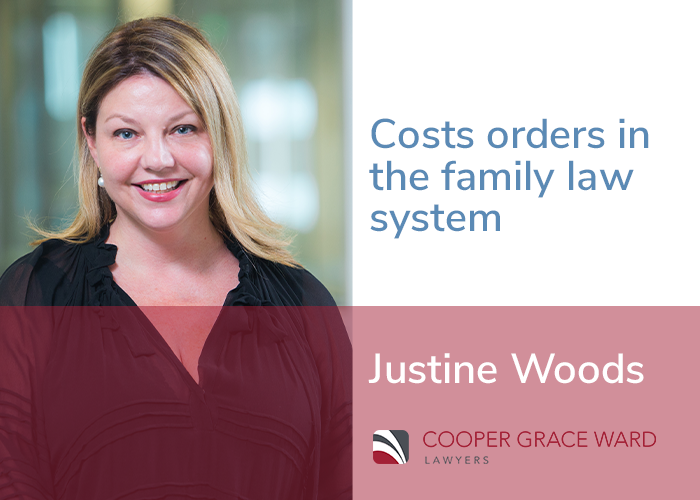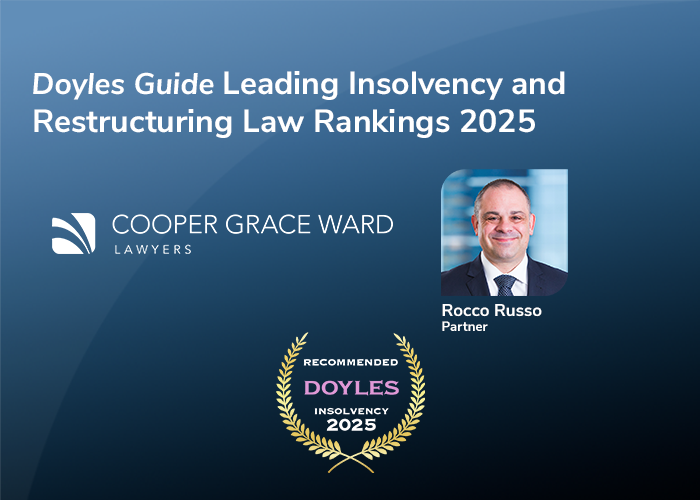In this video, CGW family law partner Justine Woods tackles the issue of costs in the family law system.
VIDEO TRANSCRIPT
Hello hello everyone, I’m Justine Woods, I’m the family partner at Cooper Grace Ward, and today’s presentation is about the issue of costs in the family law system.
Costs orders in the family law system
Now, the Family Law Act says that other than in exceptional circumstances, that each party should bear their own costs. And so really, a course of conduct of some type is required before the court’s jurisdiction under 117 of the Family Law Act to order that the other side pay a contribution to your costs will be enlivened. Now ‘exceptional’ is not perhaps as exceptional as it might sound in ordinary vernacular, but you do have to show something slightly unusual, particularly in financial matters, to receive a costs order. Costs orders are more common in financial orders, and even fairly outlandish and doomed parenting applications will rarely attract costs orders. But in a financial matter, if you proceed to a contested hearing and you don’t better an offer that’s been made to you, the other side will inevitably apply to the judge to have you pay some of their costs. So, that means at all points, even if you are fighting it out in a family court hearing, you need to be conscious that there are going to be consequences flowing from offers made. So, when you’ve still got the opportunity to make some choices about the resolution of your matter, think very seriously about the costs orders, that the offers that have been put to you, because costs orders and consequences may follow.
Case examples
So, a perfect example of that is a case that’s just been decided this year of Safa and Maluf. And in that case during the process of negotiation, one party put an offer to the other side, rejected. The offeror made an application to the court proposing a 75/25 division of the assets in her favour. They went to arbitration, which is a process outside of the court where an arbitrator who has effectively stands in the position of a judge makes a decision, but in a less formal context and generally more quickly and for less expense (and we’ve got a little presentation about arbitration for you on another day) gave the husband less than what he had been offered by the wife some time ago prior to that process. And so the arbitration and the court system interact, and the wife was then able to apply to the court and say, ‘Well, my husband should pay some of my costs because he didn’t take the offer that I made to him. He’s been given less by the arbitrator’ and in a net effect… and so the court really looked into the costs application case about what was the true monetary effect of the offer that had been made.
So, percentages are one thing, and oftentimes people are obsessed with percentages, and your lawyer will absolutely need to give you very detailed advice about your likely percentage entitlements. But in the end, it’s generally a dollar figure and the court will look at what it really means, what the offer has meant. And so in that case, even though the husband said he was impecunious and couldn’t pay, he was ordered to pay the wife’s costs. So that’s a case that I will cite in a costs application when I’m bringing them for clients. It’s a helpful piece of… it’s a precedent. It’s a helpful precedent to buttress a costs application. However, I would say in a human context, it’s another reminder that when you have control over a matter, when you are making the decisions that can bring the matter to an end or prolong it, think very seriously about what the offer truly means. If it’s a terrible offer. If your advice is, this is so far out of the range and so preposterous, it’s unlikely, go for your life. If it’s not, think about what it might mean commercially in perhaps a year’s time if you’re before a judge adjudicating on a costs issue.
What should I do next?
If you’d like to talk about that whether you’ve started litigation or not, please feel free to contact us at Cooper Grace Ward.





